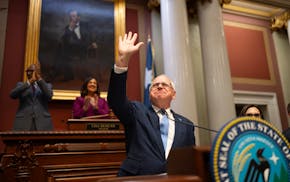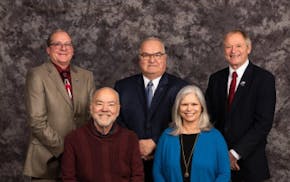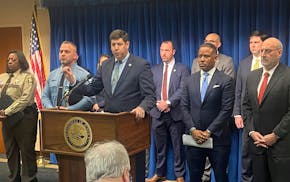Some of the slew of laws passed in the 2023 legislative session are aimed at making it easier for eligible voters to cast ballots, and advocates hope that will mean Minnesota voters, who have voted at some of the highest rates in the country in recent elections, turn out in even higher numbers this year.
With early voting now underway, Minnesota voters will start to see some of these new laws.
Absentee voting has become more prevalent since the pandemic, and new laws expanding early in-person voting are in effect. Voters can still request mail-in absentee ballots for any reason — or no reason at all, under the state's no-excuse absentee ballot law.
Starting this year, voters can put themselves on a permanent absentee voter list, meaning they will get a ballot mailed to them for every election.
"It can't be any easier than voting from home," said Michelle Witte, executive of the nonpartisan League of Women Voters Minnesota.
During a news conference Thursday, Secretary of State Steve Simon suggested that people who plan to vote by mail budget at least a week to return their completed ballots.
"We are seeing some delays nationally with the U.S. Postal Service," Simon said, and added that he is particularly concerned about the proportion of mail that has lately been marked "undeliverable" when there was not any problem with the address. He wants to make sure people who request absentee ballots get those ballots with enough time to mail them back.
Simon wants to see additional training and resources for the postal service. But, he said, the way the service handled the last presidential election gives him hope.
"2020 was the ultimate stress test when it came to the mail and the number of people choosing to vote by mail," Simon said. If the postal service was able to handle the flood of mailed-in ballots during the pandemic, he said, he's confident there will not be major issues this November.
Mail-in voting has not been as common since the 2020 election, Witte said.
In-person early voting will also be easier this year with expanded weekend voting hours at early-voting locations.
Witte said a legislative change will mean that people who vote up to 18 days before Election Day in-person will be able to put their ballots into a tabulator. Previously, only people who voted a week before Election Day could feed their ballots into the machines. She said that gives people more confidence their ballots will be counted.
Since April, the Secretary of State's Office reports more than 90,000 voters have been registered or pre-registered through the "automatic voter registration" system that signs people up to vote when they get drivers' licenses.
While Minnesota grants driver's licenses to residents regardless of immigration status, officials say the ID requirements provide sufficient safeguards against illegal voting.
"It's really not automatic," Witte said. "You do have to prove your citizenship."
Simon also noted expanded hours for in-person voting across the state, and tweaks to the automatic voter registration system that will make sure only eligible voters are registered.
A lesser-known law change lets voters bring as many people as they want to the voting booth, removing an earlier three-person limit. Witte said she thought that would help first-time voters feel more confident about what they will encounter at a polling place.
"It doesn't have to be scary and isolated," she said.
Outside of early and absentee voting, Witte thinks one of the biggest changes to election laws is letting 16- and 17-year-olds who will be 18 by Election Day pre-register to vote.
"That's to me one of the most consequential laws that expands voter access," Witte said. Voters 18 to 24 years old tend to vote less than older voters, she said, "but when they are registered, they vote near 90%."
Simon said he hopes Minnesota will have the nation's highest rate of voter turnout again. But it will be a little harder this year, he said, because tens of thousands of people are newly eligible to vote.
This year, some 57,000 people who have served prison sentences for felony convictions got their right to vote back after legislation in 2023.
Witte said the League of Women Voters has been working to register those who have served their time to vote this year. The league has also been registering voters at the record-expungement events the Attorney General's Office has put on for people with marijuana convictions.
Witte said in addition to the 57,000 people with felony convictions who have left prison and are now eligible to vote, there are tens of thousands of others who have been involved in the justice system and are only now learning that they are eligible voters — and those people are starting to register, she said.

As Rep. Angie Craig takes her town halls to greater Minnesota, Republican colleagues say she may be violating House ethics rules

Gov. Walz excoriates Trump, offers olive branch to MN Republicans in State of the State speech

Minnesota county commissioner, whose wife wanted him to step down due to cognitive concerns, resigns

Federal jury convicts three Minneapolis 'Highs' gang members of murder, racketeering

